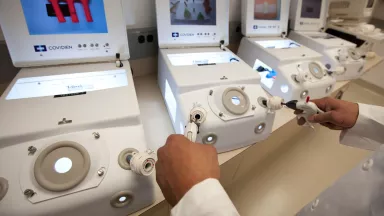Introduction
Our world-renowned orthopedic surgeons and orthopedists are experts in their fields with specialized training to provide the optimal diagnosis and treatment for a range of orthopedic conditions. We are internationally recognized for delivering the highest-quality orthopedic care to our patients.
What is patellar dislocation?
The kneecap (patella) is normally positioned over the front of the knee joint at the base of the thigh bone. A kneecap can be dislocated, or moved out of its normal position, when the inner edge of the kneecap is hit, pushing it toward the outer side of the leg. This can happen more easily if there is patellar tracking disorder (the kneecap is already slightly out of place), and it is also a common sports injury.
What are the symptoms?
Symptoms of a dislocated kneecap may include:
- Severe pain
- A misshapen knee that looks like a bone is out of position
- A popping sensation, followed by a feeling that something is out of place
- Inability to bend or straighten the knee
- Knee swelling
- Cool, pale skin or numbness and tingling in or below the affected knee
A dislocation can cause other problems, even if the bone pops back into place. If the dislocation was due to weak thigh muscles or a problem with the alignment or structure of the knee bones, the knee may dislocate again.
Ligaments, tendons, muscles and cartilage in or around the joint may stretch or tear. A piece of bone may break off somewhere in the knee joint. If the dislocation was due to weak thigh muscles or a problem with the alignment or structure of the knee bones, the knee may dislocate again.
Physician Referrals
Montefiore Einstein embraces a collaborative approach.
If you have a patient who could benefit from our services, please reach out.
718-920-2060
Schedule a Visit
Have a general question or concern?
We’re available to help you by phone or email.
• 718-920-2060 • orthofeedback@montefiore.org






